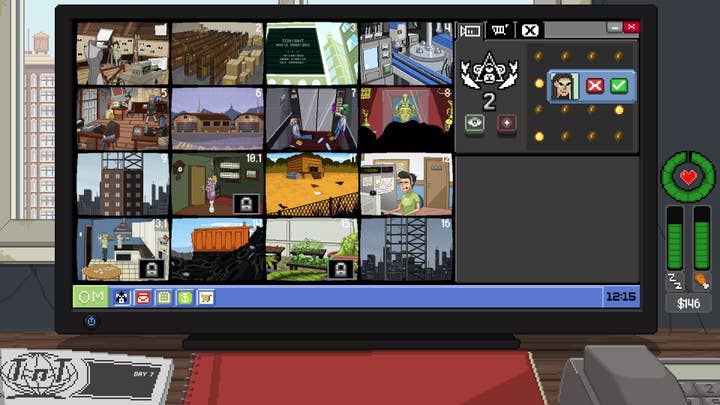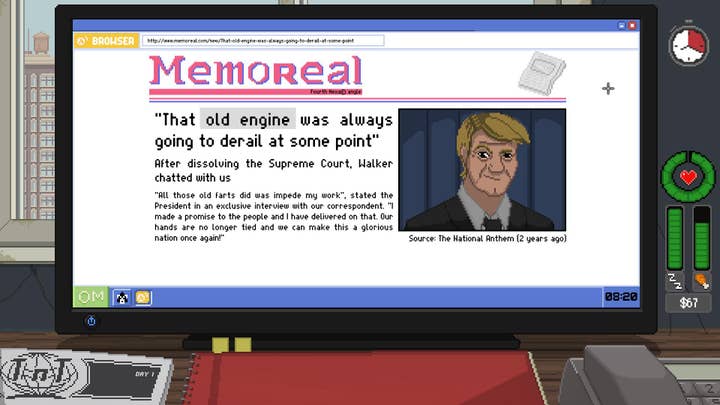Truth is stranger than Fictiorama
Co-founder Luis Olivan talks about how the real world caught up to the satire in Do Not Feed The Monkeys over the three years it took to make the IGF-nominated title
When they founded Fictiorama five years ago, brothers Mario, Alberto, and Luis Oliván had never made a commercial game before. But between them, they had experience programming, writing, and producing, and figured with a little help on the art side, they'd be able to put together a game. As Luis explained in a recent conversation with GamesIndustry.biz, they were successful in part because they kept their ambitions in check.
"We felt quite safe making point-and-click adventure games because we'd been playing narrative-driven games for ages," he said. "That's why we made the company, to be honest. Because we had a really good time playing this kind of game as siblings when we were teenagers, so we decided to make them. But we didn't know how to make a game, so we decided to make a point-and-click adventure game because we managed the mechanics quite well because we'd played dozens and dozens of point-and-click adventure games in the past."
That game, Dead Synchronicity: Tomorrow Comes Today, went on to win a few awards and respectable reviews as it was released across everything from PC to mobile platforms to Switch. It also emboldened them to try their hand at something a little different.
"Our first game, Dead Synchronicity, is really a dark, dark game," Luis said. "It makes you do horrible things in order to finish the game. It tells a really dark story, and we wanted to do something different. We didn't want to go into that darkness again. We wanted to make some kind of a lighter game."
That game would be Do Not Feed The Monkeys, and just how much "lighter" it is would be a matter of opinion. Do Not Feed The Monkeys is billed as "a digital voyeur simulator", with the player observing strangers through surveillance cameras as part of "The Primate Observation Club", tasked with analyzing the actions of their subjects but warned not to interact with them. Of course, it's up to players to decide whether they want to follow that rule.
"We talk about lots of different things: surveillance, social media, cameras on the street, and how you give information about yourself all the time. And you don't know exactly what happens with the information you provide"
"We wanted to make a game in which the main mechanic was to look at other people," Luis said. "We found that interesting. We realized everyone, all of us, look at other people. Maybe because they're sat in front of you on the subway, or you're waiting in queue and you hear what they're talking about or notice what their clothes look like, and you start to wonder about their lives. That's something we all do all the time, even in an inadvertent way."
Luis acknowledged the game still has a dark sense of humor to it, but said it was still a significant departure from Dark Synchronicity.
"We didn't want to make this a creepy, dark game. We know a subject like this can be easily turned into a creepy, dark mood," Luis said, adding, "We also wanted to do a game that was fun to play. That's our main goal as developers. We want players to sit in front of their computers and have a really good time, entertaining themselves and having joy, even if what they're doing is dark, or hard, or whatever.

"With Do Not Feed The Monkeys, we talk about lots of different things: surveillance, social media, cameras on the street, and how you give information about yourself all the time, just because you want to sign into a service or whatever. And you don't know exactly what happens with the information you provide."
Luis pointed to the Facebook Cambridge Analytica scandal as one recent event that should give people pause to reconsider just how safe their information is.
"When you take a walk and see a surveillance camera, you don't know what's happening with that video feed," Luis said. "We all do this kind of thing every day, give information about ourselves, share things about our private lives on social networks. It's one of those things we do; everyone does these days, and we wanted players to think about that as well. And the game talks about political issues, economic issues, financial issues, and cultural issues. We wanted to talk about lots of different aspects, but only once the player has a good time."
"We wanted to create a world that was a bit exaggerated, some kind of a parody of the real world three years ago... And right now, the world Do Not Feed The Monkeys depicts is not the real world, but it's much closer than we would like it to be"
If it sounds unusual to address such anxiety-inducing topics in a game whose top priority is providing players with a good time, consider that the world Do Not Feed The Monkeys released into is a bit different than the one in which it was first conceived.
"We started working on Do Not Feed The Monkeys three years ago," Luis explained. "When we started making the game, we knew it would talk about political, financial, and technological issues. We wanted to create a world that was a bit exaggerated, some kind of a parody of the real world three years ago. But as we developed the game, we realized that the world has changed. And right now, the world Do Not Feed The Monkeys depicts is not the real world, but it's much closer than we would like it to be. It was very surprising for us. What we thought would be some kind of light dystopian situation is more similar to reality. It's like the future has caught [up to] us."

That's not the only thing that has changed since Fictiorama started work on Do Not Feed The Monkeys. The environment for indie games has also changed dramatically. And while many would say it's been a change for the worse, Luis tries to see the upside in those changes.
"Every day there are more and more games in the stores, which is cool," he said. "I think we're lucky to be in a moment where there's a game for everyone. It doesn't matter what kind of game you want to play, there's a game for you... It's easier than ever to make a game and publish a game. And that's great. On the other hand, of course, every day it's much more difficult for people to notice your game. Not just to buy your game so you can survive as a studio, but that they notice your game, that they know it's been released."
That's a challenge for every developer, Luis said. And from his perspective, one of the most crucial components of building awareness comes in the form of publishers. Fictiorama has worked with a number of partners (Daedalic Entertainment for Dead Synchronicity, Alawar for Do Not Feed The Monkeys, and Badland Games on both) and always found the relationships very positive.
"We've always kept our creative independence," Luis noted. "No one has ever tried to make us change creative things in a game, no censorship or whatever. That's great and awesome. And we always follow the publisher's advice about marketing and PR and those things. They're the ones that know about those things. But for us, it's important to keep the freedom to make the kind of game we want."
As for what to look for in a publishing partner, sometimes it can be as looking for someone who found success with a similar project. If you need to reach gamers with a penchant for dystopian voyeur simulators, maybe start with someone who was already able to identify and talk to exactly that group of people.
"When we started looking for the right publisher for Do Not Feed The Monkeys, our development partner Badland Games thought Alawar was the perfect candidate because it had published Beholder in the past and it did really, really well."
2016's Beholder was another surveillance game, casting players as a landlord in a totalitarian country who spies on tenants for the government. It was a breakout hit for developer Warm Lamp Games, generating sparkling reviews, winning a number of awards, and spawning ports for console and mobile platforms, downloadable content, and a full sequel that launched last month.
"One of the good things about Aalwar besides being cool people and the communication with them has been great is that they have a really big community, and they know how to reach that community, the right target for the game," Luis said. "And they've done a splendid job."
At the very least, some influential people are well aware that Do Not Feed The Monkeys has been released. The game has been nominated in three categories for this year's Independent Games Festival Awards, including the Seumas McNally Grand Prize. Winners will be announced at GDC 2019 in March.

